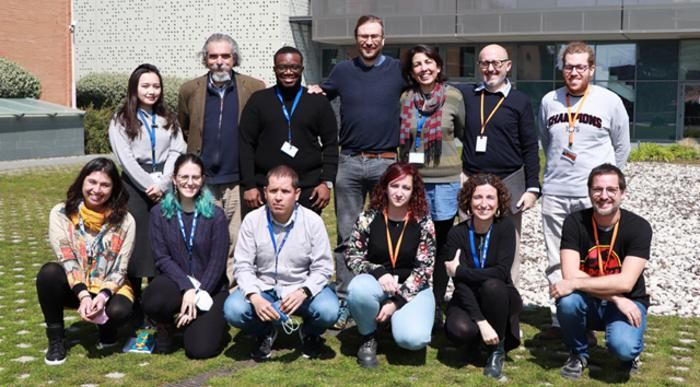
|
News Release 2-FEB-2024
COVID-19 vaccination in people with HIV, a pending issue
Two studies by CEEISCAT with the PISCIS cohort show that people living with HIV have been less vaccinated with the full initial regimen against COVID-19
GERMANS TRIAS I PUJOL RESEARCH INSTITUTE

IMAGE:
PISCIS COHORT GROUP
CREDIT: IGTP-CEEISCAT
In December, the journal Vaccines published an analysis of COVID-19 vaccination coverage among people with HIV in Catalonia between December 2020 and July 2022. The article, resulting from a study funded by the Fundació La Marató de TV3 and led by the Centre for Epidemiological Studies on HIV/AIDS and STI of Catalonia (CEEISCAT), a group from the Germans Trias i Pujol Research Institute (IGTP), in collaboration with researchers from the PISCIS Cohort group, evaluates the primary, monovalent, and booster doses. This research aims to develop concrete action plans tailored to specific profiles to facilitate and promote vaccination.
The study included a sample of over 200,000 individuals, 18,330 of whom have HIV and were vaccinated against COVID-19. The researchers observed a lower rate of complete primary vaccination schedule in people living with HIV (78.2%) compared to those without this condition (81.8%), with the difference being more pronounced among migrant populations. However, people living with HIV received more booster doses than the rest.
The authors identified several factors that may contribute to the lower complete vaccination rates: having a previous diagnosis of SARS-CoV-2, the status of HIV infection, being a migrant, or having a complicated socioeconomic situation. These factors reflect barriers to vaccine access and healthcare.
The analysis has helped identify patterns and contexts that encourage vaccination against SARS-CoV-2 among people living with HIV, as well as determining the need to improve vaccine access and address the hesitancy of vulnerable populations in taking the doses, highlighting their efficacy and safety.
The gap widens among migrant populations
The same group of researchers has published another article in the Open Forum Infectious Diseases journal, this time focusing on migrant individuals with HIV. The findings indicate that these individuals (over 3,000 in the sample) have undergone fewer SARS-CoV-2 tests, yet they have a similar cumulative diagnosis rate as local natives. Their vaccination rate, both in terms of the complete schedule and booster doses, is lower compared to those born in Catalonia. In contrast, there were more hospitalisations and admissions to the Intensive Care Unit (ICU) among migrants, even with similar durations of stays and mortality rates. Moreover, having two or more comorbidities in migrant individuals has been associated as a risk factor for severe COVID-19.
The study suggests possible impediments that could justify these results, such as economic inequalities, lack of information, structural discrimination, language barriers, or distrust in the healthcare system. With this data, strategies are expected to be developed to reach the migrant population and promote vaccination, as it is crucial for protecting the individual and curbing future epidemics at a social level.
METHOD OF RESEARCH
Observational study
SUBJECT OF RESEARCH
People
ARTICLE TITLE
Comparative Analysis of Primary and Monovalent Booster SARS-CoV-2 Vaccination Coverage in Adults with and without HIV in Catalonia, Spain
ARTICLE PUBLICATION DATE
30-Dec-2023
COI STATEMENT
JMM reported receiving a personal 80:20 research grant from Institut d’Investigacions Biomèdiques August Pi i Sunyer (IDIBAPS), Barcelona, Spain, during 2017–24 and consulting honoraria and/or research grants from Angelini, Contrafect, Genentech, Gilead Sciences, Jansen, Lysovant, Medtronic, MSD, Novartis, Pfizer, and ViiV Healthcare, outside the submitted work. DKN reported receiving consultation fees from OPIS outside the submitted work. JA has received personal fees from ViiV, Gilead, Janssen and MSD, has participated in Advisory Boards for ViiV, Gilead, Janssen and MSD, received funding for research from ViiV, Gilead and MSD, has been member of Data Safety Monitoring Boards for HIPRA and Grifols, all outside the current work. AI reported that his institution received research grants from Gilead Sciences, MSD, Janssen and ViiV and he personally received consultation fees from Gilead Sciences, Janssen, ViiV Healthcare, and Thera Technologies; honoraria for lectures and presentations from Gilead Sciences, MSD, Jansen, and ViiV Healthcare; travel support for attending meetings from Gilead Sciences, Jansen, and ViiV Healthcare, all outside the submitted work. JML has received consulting honoraria from Gilead Sciences, Janssen-Cilag, and ViiV Healthcare, all of them outside of the present work. RMI has received consulting honoraria from ViiV Healthcare and MSD outside the submitted work. PS has received honoraria and/or speaking fees from Gilead, Janssen-Cilag, Merck Sharp & Dome, Pfizer, and ViiV Healthcare, and has received a research grant from ViiV Healthcare, all outside of the submitted work. For the remaining authors, no conflicts of interest were declared. The funders had no role in the design of the study; in the collection, analyses, or interpretation of data; in the writing of the manuscript; or in the decision to publish the results.
Disclaimer: AAAS and EurekAlert! are not responsible for the accuracy of news releases posted to EurekAlert! by contributing institutions or for the use of any information through the EurekAlert system.
Media Contact
Tamara Gutiérrez
Germans Trias i Pujol Research Institute
tgutierrez@igtp.cat
Office: 93 554 3054
Source:https://www.eurekalert.org/news-releases/1033245
"Reproduced with permission - Germans Trias i Pujol Research Institute"
Germans Trias i Pujol Research Institute
For more HIV and AIDS News visit...
Positively Positive - Living with HIV/AIDS:
HIV/AIDS News |